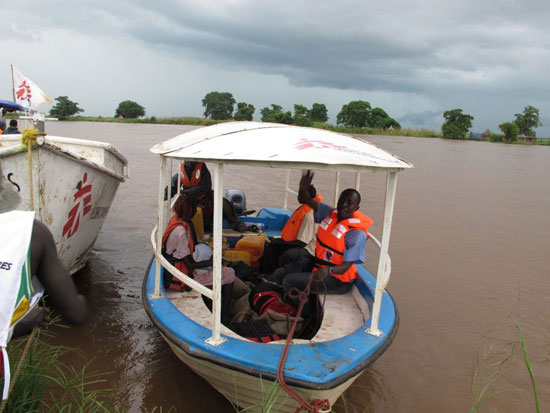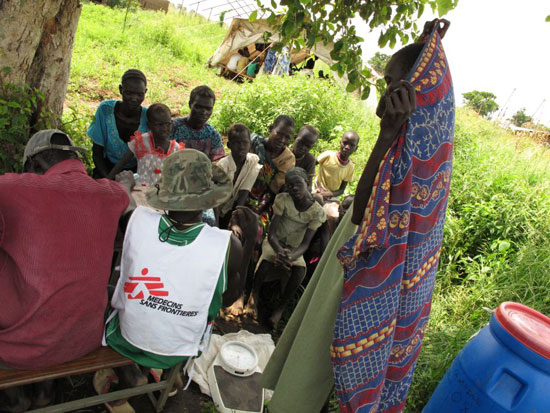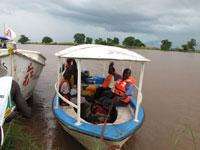In Ethiopia’s western Gambella Province, MSF teams are working to provide access to health care to an extremely remote and mobile population.

Ethiopia © Francois Servranckx/MSF
During Ethiopia’s rainy season, MSF staff travel by boat to conduct mobile health clinics.
In Ethiopia’s western Gambella Province, Doctors Without Borders/Médecins Sans Frontières (MSF) teams are working in cooperation with the Ministry of Health and Regional Health Bureau to provide access to health care to an extremely remote and mobile population. Rebeckah Piotrowski served as MSF’s deputy field coordinator for the project; she recently returned home after six months in Ethiopia, helping to get the project going.
What is the purpose of this new project in Ethiopia?
The main goal of the project is to provide access to health care for a population that is completely ignored and underserved. Most of the people we are treating have never seen doctors before. I think the impact on the community is quite huge.
The population is very nomadic. They move around with their cattle depending, on if its dry or rainy season. They're very mobile, which sends them to areas that are very, very hard to access.
How has MSF been able to reach them?
The program is located in a remote area of the province. We’ve set up a health clinic with an inpatient and an outpatient ward. We also send out teams of nurses in mobile clinics to help reach more people.
In the rainy season, all of the mobile clinics are by boats. In the dry season we can do it by car. We are reaching out to populations that have absolutely no access to very basic things, like health care and water.

Ethiopia © Francois Servranckx/MSF
MSF staff run a mobile clinic in a remote community.
Was it challenging setting up this remote project?
In the rainy season the project is 10 hours by boat to the nearest town. Everything had to come from the capital of the province because there was no market, food, or construction material where the health center was needed. The supply chain setup was initially a huge challenge.
Transportation is a continuing difficulty. Doing everything by boat during the rainy season is quite intense. MSF has never done this type of transport before, figuring out even basic things like fuel quantities or boat maintenance is an ongoing challenge.
What kinds of medical needs are MSF teams seeing?
The number of patients changes depending on dry or rainy season. When I left it was dry season and easier to travel so there was a peak in patient numbers. During the dry season we mainly see and treat malaria, malnutrition, and basic healthcare needs. We are also seeing cases of tuberculosis (TB) and HIV. Currently, MSF refers TB and HIV cases to the regional hospital in Gambella for chest X-rays and drugs. While it might change in the future, the project does not have the capacity to treat these types of cases.
MSF is also trying to expand maternal health care. We are trying to get mothers to come in for pre- and post-natal visits and also to deliver in our health center. However, we haven’t seen a significant increase yet.
Why don’t the mothers come to the health centers for deliveries?
First, I think it’s connected with community awareness and trust. The project is still very new and it's not very culturally accepted to give birth in a health center. It's normally done at home. Women aren’t even supposed to leave their home for two or three weeks after they give birth. Second, lack of access, especially during the rainy season, is still a huge factor even as we are working to improve this.
How do you see the project going forward?
The health center is running very smoothly, so now we are starting to look outwards. MSF is working with the Regional Health Bureau and Ministry of Health staff to increase outreach. We want to train them more on basic health issues and teach them about MSF. We want them to know that if there are serious problems, they can refer patients to us. I think we can also do a lot more with the mobile clinics. We can explore more locations and ways to provide access to more and more people.




